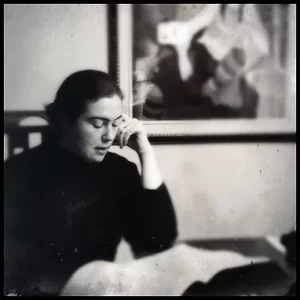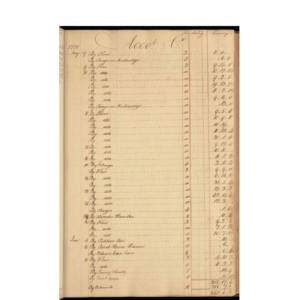 Molly Kerr, the Founding Director of History Revealed, Inc., a non-profit, historical research organization, kindly spoke with Sara Brumfield about their experience using FromThePage.
Molly Kerr, the Founding Director of History Revealed, Inc., a non-profit, historical research organization, kindly spoke with Sara Brumfield about their experience using FromThePage.
First, tell us about your documents.
The Shopping Stories project focuses on store ledgers from the 18th century. Our first phase transcribed the John Glassford & Company store ledgers from Alexandria and Colchester, Virginia (1758-1769). For this second phase, we are using FromThePage to transcribe ledgers from Alexandria, Virginia, found in the manuscript collection at the New York Public Library: the Hooe Stone & Company (HSC) ledger from 1770-1773 and the John Mills personal ledger from 1775-1785 (in 3 parts), with plans to include additional ledgers in the near future.
The HSC ledger is the first by date in a series of ledgers, invoice books, and letterbooks detailing the business of Robert Townsend Hooe and his various business partners for his Alexandria store from 1770-1802. The Mills ledger, found in the same collection, is particularly interesting as it details purchases made as he constructed his home – Shuter’s Hill – and includes the role of the enslaved laborers who participated in its construction.
Eighteenth-century ledgers detail tabular data recording account holders, purchases, and payments. These transactions are very different from the typical prose of a letter or diary entry and are especially valuable for revealing significant information in the lives of less recognized members of a community, like women and the enslaved, through their accounts and purchases by them, and on behalf of them, by others.

What are your goals for the project?
In using FromThePage, we want to continue to provide opportunities for crowdsourced transcribing. FromThePage will allow us to broaden our transcriber corps of volunteers through the use of this online and more accessible platform. We hope to generate interest in the ledgers by the local community, as well as more regionally given the store and customer connections beyond the city’s borders.
Tabular data, particularly financial records, can be especially daunting – and that’s before you factor in the challenges of reading 18th-century, cursive writing. The tabular transcription format will ultimately provide us with the ability to conduct analyses on the documents, such as the visualization of social and geographical networks, consumer trends, and pricing and value of items. At present, we are developing a database for importation of the transcripts in preparation for this kind of analysis; the transcription template on FromthePage allows for consistency of transcribing the information – even when it doesn’t visually match the original. The content is what is important for us.
Careful and systematic transcription of the store accounts combined with the ability to search these accounts in a database online will provide a means to better interpret archaeological sites, furnish historic rooms in house museums, bring to life museum exhibits, and fully appreciate the 18th-century material world.
How are you recruiting or finding volunteers/collaborators?
This endeavor is an expansion of our previous efforts, and we began recruiting using our existing collaboration networks, as well as reaching out via our social media outlets. Because our organization is so small, we have elected to keep the project open to the public in hopes of reaching the largest possible pool of volunteers to assist us in transcribing the ledgers.
We want the project to engage a wide array of people, though we recognize that the format and content (especially abbreviations and unfamiliar words) can be challenging. In the near-future, we plan on hosting a transcribe-a-thon to encourage those who are interested in the subject matter but intimidated by the handwriting, the structure of transcribing, and/or the overall content of the financial documents, to showcase how much can be learned from them.
Can you share your experience using FromThePage?
I learned about FromThePage over 6 years ago when I heard about Anna Agbe-Davies project transcribing account books related to slavery in North Carolina. However, as analysis and database importation were among one of my primary project goals (and we were already transcribing in spreadsheets), I decided to wait patiently for the platform to develop its tabular data component. Our patience paid off with its release this spring. While it still has a few growing pains, we have found the platform to be easy to set up and straightforward to use. I have had to alter some of our previous approaches as the platform lends itself to an HTML/XML output, and the project’s editorial marks (especially angled brackets) confused the system. Ben and Sara Brumfield have been immensely helpful in talking me through how to set everything up and find alternative strategies – I especially like all the tutorials and opportunities to engage with other users via webinars!
The previous phase of the project used spreadsheets, cloud file storage, and emails – lots and lots of emails. FromThePage has allowed a centralized location for us to share with our social networks and interested volunteers, to hold all the research results of the transcribers (in the Notes and Questions section), and a transparent process from transcribing, review, and answering of questions.
How does FromThePage & crowdsourcing fit with your organization’s goals?
History Revealed, Inc., was created to investigate and to tell the rest of the story without being limited to a specific time period, person, or document set. Our hope is to do this historical research transparently and to engage the community through collaborative efforts – to get the community involved in the process from start to finish. We received funding from the Omohundro Institute and the Historic Alexandria Foundation to specifically enable these ledgers to be more publicly accessible. Using FromThePage allows us to meet this goal and engage the public in not only presenting the digital images of the pages, but also in the creation of reproducible content. It also enables us to continue our efforts by helping us learn more about the people, places, and things found in the ledgers as we transcribe the pages and dig into other sources to complement what is found.
What would you tell folks considering a similar project?
Be prepared to set up as much as possible before you get started and to not have it work the way you think it will. We created a small group of collaborators, both experienced and inexperienced with our project, to try to navigate our FromThePage project for the first couple of months. Your experienced folks will be challenged by the change in design and layout and your inexperienced folks will tell you what doesn’t work the way you thought it would (especially regarding instructions). After having conducted a previous phase of this project for several years, more-or-less offline, the transition to using FromThePage presented new and unexpected challenges, however, our project is better because of them.
Anything else you'd like to tell us?
As an early adopter of FromThePage’s field-based project, we are excited to have a new way to do our work – and have recommended it to others doing similar projects. We hope to add more ledgers to the project soon and look forward to a continued collaboration with the community to learn more about the 18th-century people, places, and things found within their pages.
Get involved with FromThePage:
Want to help transcribe Molly's documents? Find her projects here.
Ready to start your own project? Start a free trial!
